Previewing Maxiotek's MK8115 SSD Controller: Can DRAM-less Drives Make The Cut?
by Billy Tallis on May 9, 2017 8:00 AM ESTSequential Read Performance
The sequential read test requests 128kB blocks and tests queue depths ranging from 1 to 32. The queue depth is doubled every three minutes, for a total test duration of 18 minutes. The test spans the entire drive, and the drive is filled before the test begins. The primary score we report is an average of performances at queue depths 1, 2 and 4, as client usage typically consists mostly of low queue depth operations.
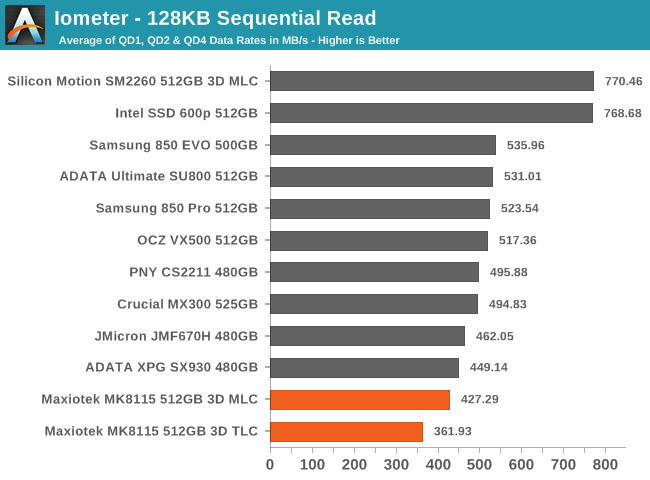
The two MK8115 drives land at the bottom of the performance rankings again for the sequential read test. They aren't really close to saturating the SATA 3 link at low queue depths, but both do at least offer significantly higher throughput than a SATA 2 link could provide, and the fact that the competition is limited by SATA 3 means the MK8115 drives fall behind by a smaller percentage than would otherwise be the case.
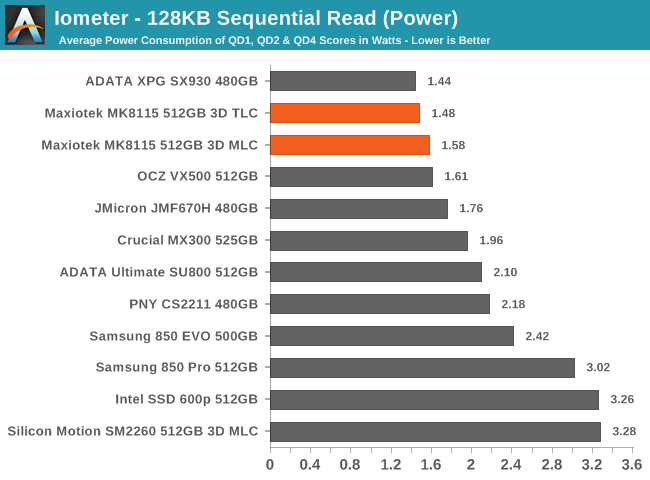
To go with their low performance the MK8115 drives offer almost the lowest power consumption, so the power efficiency is at least reasonable. The ADATA SX930 based on the JMicron JMF670H controller manages to deliver higher throughput with less power, so the lack of a DRAM cache seems to be hurting more than helping efficiency on this test.
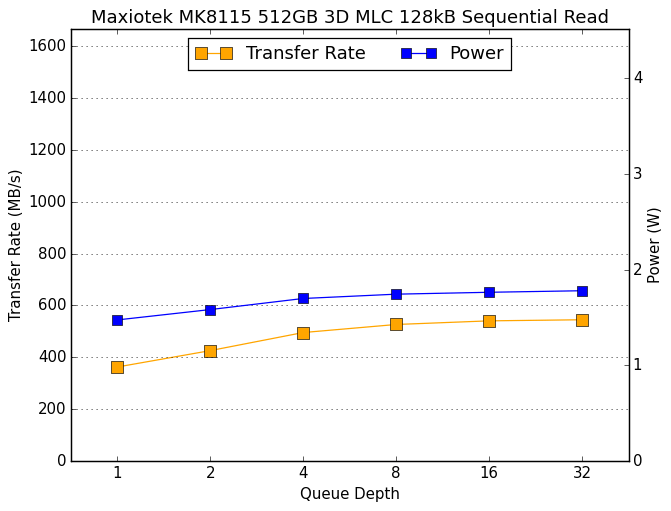 |
|||||||||
Like most SATA drives, the performance scaling as queue depth increases is mostly flat. There's slight performance growth all the up to QD16 while many SATA SSDs are able to offer their full sequential read throughput at QD2.
Sequential Write Performance
The sequential write test writes 128kB blocks and tests queue depths ranging from 1 to 32. The queue depth is doubled every three minutes, for a total test duration of 18 minutes. The test spans the entire drive, and the drive is filled before the test begins. The primary score we report is an average of performances at queue depths 1, 2 and 4, as client usage typically consists mostly of low queue depth operations.
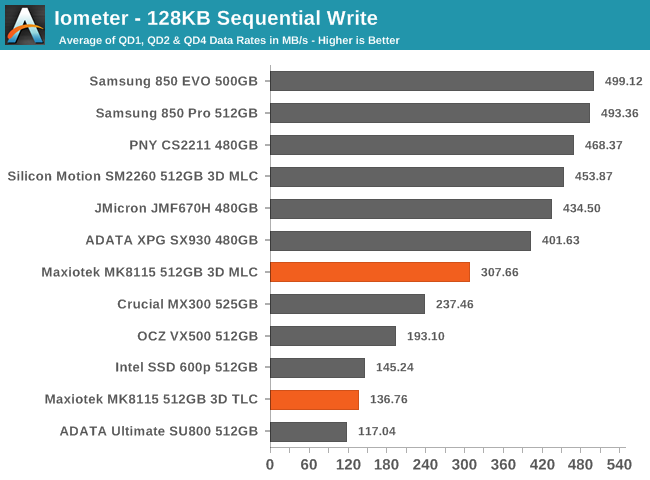
The sequential write test reveals one of the biggest gaps between the MLC and TLC based MK8115 drives. The TLC drive is almost the slowest drive on this test, but the MLC drive is more than twice as fast and outperforms most TLC SSDs while not quite matching typical MLC performance.
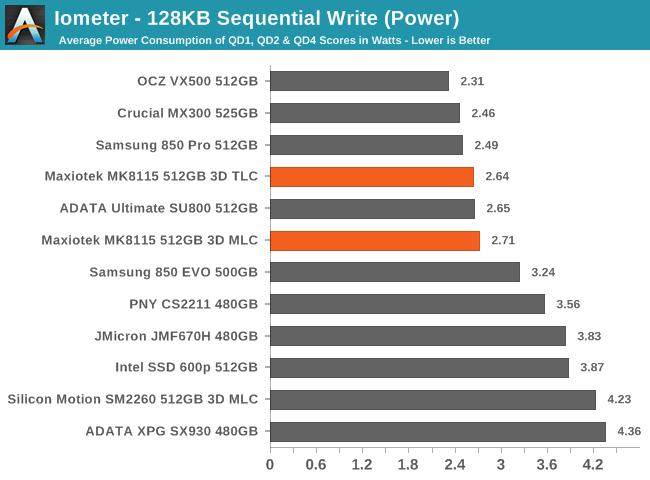
Both MK8115 drives had similar power consumption on the sequential read test, revealing the MLC drive to be far more efficient but still nothing great compared to the competition.
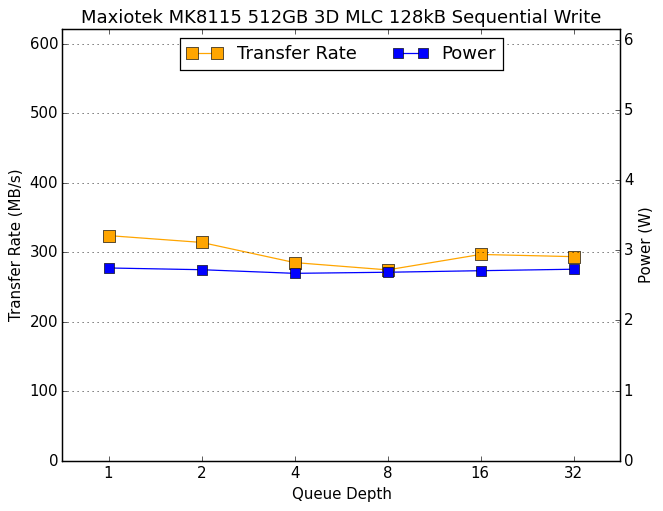 |
|||||||||
The MK8115 drive with MLC experiences a bit of trouble near the middle of the sequential write test, as write speeds drop slightly, but by the end of the test they've mostly recovered and power consumption has been constant across queue depths.










60 Comments
View All Comments
MajGenRelativity - Tuesday, May 9, 2017 - link
That might be a long way awayvladx - Tuesday, May 9, 2017 - link
You're gonna have to wait till mid-2019 for that.CheapSushi - Wednesday, May 10, 2017 - link
You'll get that most likely when QLC drives come out. But consider they'll be for bulk storage rather than general use.MajGenRelativity - Thursday, May 11, 2017 - link
YepHomeworldFound - Tuesday, May 9, 2017 - link
There's definitely some kind of manipulation occurring in the memory industry, it's happening with both DRAM and NAND.FH123 - Tuesday, May 9, 2017 - link
Let's see. JMicron SSD drives stalled (I had one). Two different USB drive enclosures, featuring JMicron chipsets, caused random data corruption for me and my colleague. The DVD / Blueray drives on my desktop randomly fail to show after boot. The chip they're hanging off of? JMicron. Will I consciously buy anything from this company or their offshoots? Nope. Their chips are ubiquitous and hard to avoid, but what trash they are.romrunning - Tuesday, May 9, 2017 - link
Don't forget the infamous JMicron "stutter" problem!vladx - Tuesday, May 9, 2017 - link
I have an ADATA SP600NS34 with JMicron JMF670H and it's a solid drive with 100% life remaining after 3TB written. No slowdowns or drive timeouts either.jabber - Tuesday, May 9, 2017 - link
I'm trying to hold off buying in any SSD drives at the moment. Prices have got silly compared to what I was paying a year ago for essentially a better product.romrunning - Tuesday, May 9, 2017 - link
So true on the pricing woes - I'm hoping there is more MLC capacity coming on soon.